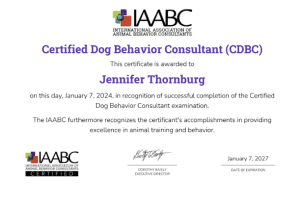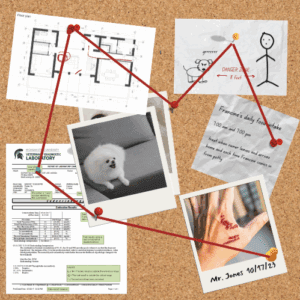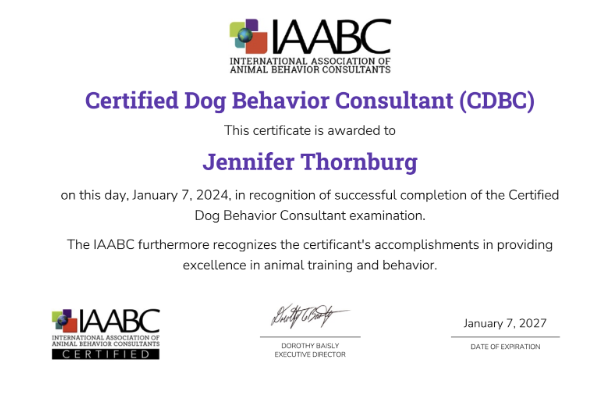What is a Certified Dog Behavior Consultant?
Did you know? There are no state or federal requirements, education, qualifications, training, experience, or skills required to start a dog training business.
Anyone can call themselves a Dog Trainer, Behaviorist, Behavior Specialist, Behavior Expert, Head Trainer, Training Specialist, Consultant, Instructor, etc.
Dog training is not the same as behavior consulting. Not all dog trainers understand how to address complex behavioral issues.
What’s the Difference Between a Dog Trainer and a Dog Behavior Consultant?
 A dog trainer is someone who trains basic to advanced training cues, teaches good house and leash manners, veterinary handling, or trains a dog for sports. Dog trainers have an understanding of learning theory and should have good handling and physical training skills. Many dog trainers have the education and experience to work on advanced behavior cases.
A dog trainer is someone who trains basic to advanced training cues, teaches good house and leash manners, veterinary handling, or trains a dog for sports. Dog trainers have an understanding of learning theory and should have good handling and physical training skills. Many dog trainers have the education and experience to work on advanced behavior cases.
A dog behavior consultant is a professional who can help you resolve problem behaviors such as aggression, fears, phobias, and other abnormal behaviors. They change behavior by getting to the root of the issue, uncovering the reason behind your dog’s behaviors by exploring patterns, trauma, genetics, environment, and individual experience.
What is Required to Become a Certified Dog Behavior Consultant?
There are two professional certifying organizations for dog behavior consultants:
- The International Association of Animal Behavior Consultants (IAABC) issues the Certified Dog Behavior Consultant (CDBC).
- The Certification Council for Professional Dog Trainers (CCPDT) issues Certified Behavior Consultant Canine-Knowledge Assessed (CBCC-KA).
Earning a CDBC or a CCBC is a lot of work!
The requirements to be certified include:
- 500+ hours of consulting experience
- 400+ hours of coursework, seminars, or mentorships
- Three professional letters of recommendation
- Adherence to “Least Intrusive, Minimally Aversive (LIMA)” principles in their work
- Familiarity with significant behavior issues including aggression
- Passing an extensive exam
- Three advanced case studies from the applicant
- Analysis of complicated behavior case scenarios
“Earning my Certified Dog Behavior Consultant designation from the IAABC was the most challenging and satisfying accomplishment of my professional life.”
– Jennifer Thornburg CDBC, KPA-CTP, CPDT KA
Why Would Someone Work with a Certified Dog Behavior Consultant?
It’s simple. You want to work with an educated, experienced specialist who uses the most up-to-date science and humane methods to help you safely, effectively, and ethically change your dog’s behavior.
If your dog is exhibiting the following, get in touch with a certified dog behavior consultant:
- Aggressive behavior towards people or dogs
- Dysfunctional/OCD behaviors
- Separation-related behaviors
- Destructive behaviors in an adult dog
- Anxiety, fears, and phobias
- Resource guarding of food, space, etc.
- Dog bites, classified “dangerous dog”
- Inappropriate urination, including marking
- Self-harm such as paw licking or tail biting
Behavior Consultants are Pet Detectives!
They gather clues and interview witnesses (you and your family). They use their knowledge and experience in canine cognition, ethology, and behavioral analysis to assess the evidence. They may also bring in another professional to help crack the case. Your behavior consultant will often refer you to your dog’s veterinarian. In some cases, they may recommend you see a Veterinary Behaviorist (kind of like Forensics!).
What is a Board-Certified Veterinary Behaviorist (DACVB)?
Veterinary Behaviorists are different from dog trainers and behavior consultants, as they are vets who have completed residency or training in behavioral medicine. They have the distinction of being a Doctor of Veterinary Medicine (DVM) and a Board-Certified Veterinary Behaviorist (DACVB). They can prescribe pharmaceutical treatments with behavior modification plans as they are practicing veterinarians. Many Veterinary Behaviorists are certified dog trainers too!
in behavioral medicine. They have the distinction of being a Doctor of Veterinary Medicine (DVM) and a Board-Certified Veterinary Behaviorist (DACVB). They can prescribe pharmaceutical treatments with behavior modification plans as they are practicing veterinarians. Many Veterinary Behaviorists are certified dog trainers too!
Good Human Dog Training may recommend you see a veterinary behaviorist for certain behavior concerns such as compulsive behaviors or phobias. There are less than 100 Board Certified Veterinary Behaviorists located throughout the world. As a result, not all states will have one. We’re lucky to have Dr. O’Brian and her team at Southeast Animal Behavior and Training just down the road in Charlotte, NC. Many Vet Behaviorists can work with you and your vet virtually.
Jennifer Thornburg is both a Certified Professional Dog Trainer and a Certified Dog Behavior Consultant. Most importantly, she is an imperfect human with challenging dogs. She gets it. She’ll listen to your concerns without any judgment and collaborate with you to create a customized training plan that will maximize behavior change in your home.
Schedule your behavior consultation with Jennifer Thornburg, CDBC



